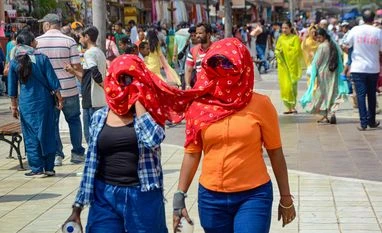The intense heat wave scorching large parts of east India will continue for another five days, the India Meteorological Department (IMD) said on Monday.
The ongoing spell of heat wave, the second this month, is broiling parts of West Bengal, Odisha, Jharkhand and Bihar.
Heatwave conditions have been prevailing in Odisha since April 15 and the Gangetic West Bengal since April 17, according to the MeT department.
In a statement, the MD said heat wave to severe heat wave conditions are expected in parts of West Bengal, Karnataka, Odisha, Tamil Nadu, Uttar Pradesh and Jharkhand during the next five days.
High humidity could add to people's inconvenience in coastal Andhra Pradesh, Tamil Nadu, Puducherry, Karnataka, Goa, Kerala, West Bengal and Bihar, it said.
Substantially high night temperatures are likely in east Madhya Pradesh on April 22 and April 23. High night temperatures are considered dangerous because the body doesn't get the chance to cool down.
More From This Section
Increasing nighttime heat is even more common in cities because of the urban heat island effect, in which metro areas are significantly hotter than their surroundings.
The threshold for a heat wave is met when the maximum temperature of a weather station reaches at least 40 degrees Celsius in the plains, 37 degrees in the coastal areas and 30 degrees in the hilly regions, and the departure from normal is at least 4.5 notches.
ALSO READ: Odisha declares summer vacation for schools as heatwave grips states
A severe heat wave is declared if the departure from normal temperature exceeds 6.4 notches.
Amid the prevailing but weakening El Nino conditions, the IMD had earlier warned of extreme heat during the April-June period when around a billion people are expected to exercise their franchise during the seven-phase Lok Sabha elections, heightening concerns about vulnerability to heat waves.
Voting for the first phase of elections took place on April 19. The second phase of polling is scheduled for April 26.
The Met office has said four to eight heatwave days are expected in different parts of the country in April against a normal of one to three days. Ten to 20 days of heatwave days are expected against a normal of four to eight in the entire April-June period.
The areas and regions predicted to witness a higher number of heatwave days are Madhya Pradesh, Gujarat, Odisha, Andhra Pradesh, Madhya Maharashtra, Vidarbha, Marathwada, Bihar and Jharkhand. Some places may record more than 20 heatwave days.
The intense heat could strain power grids and result in water shortages in parts of India.
Global weather agencies, including the IMD, are also expecting La Nina conditions to develop later in the year.
El Nino conditions -- periodic warming of surface waters in the central Pacific Ocean -- are associated with weaker monsoon winds and drier conditions in India. La Nina conditions -- the antithesis of El Nino -- lead to plentiful rainfall during the monsoon season.
In a mid-April update, the IMD said India would experience above-normal cumulative rainfall in the 2024 monsoon season with La Nina conditions, expected to set in by August-September, being the dominant factor.
The monsoon is critical for India's agricultural landscape, with 52 per cent of the net cultivated area dependent on it. It is also crucial for replenishing reservoirs critical for drinking water apart from power generation across the country.
)